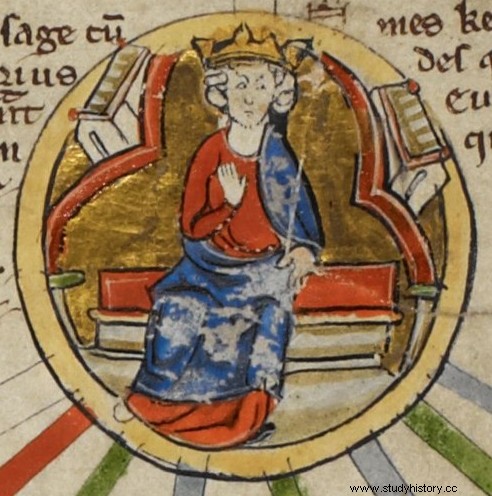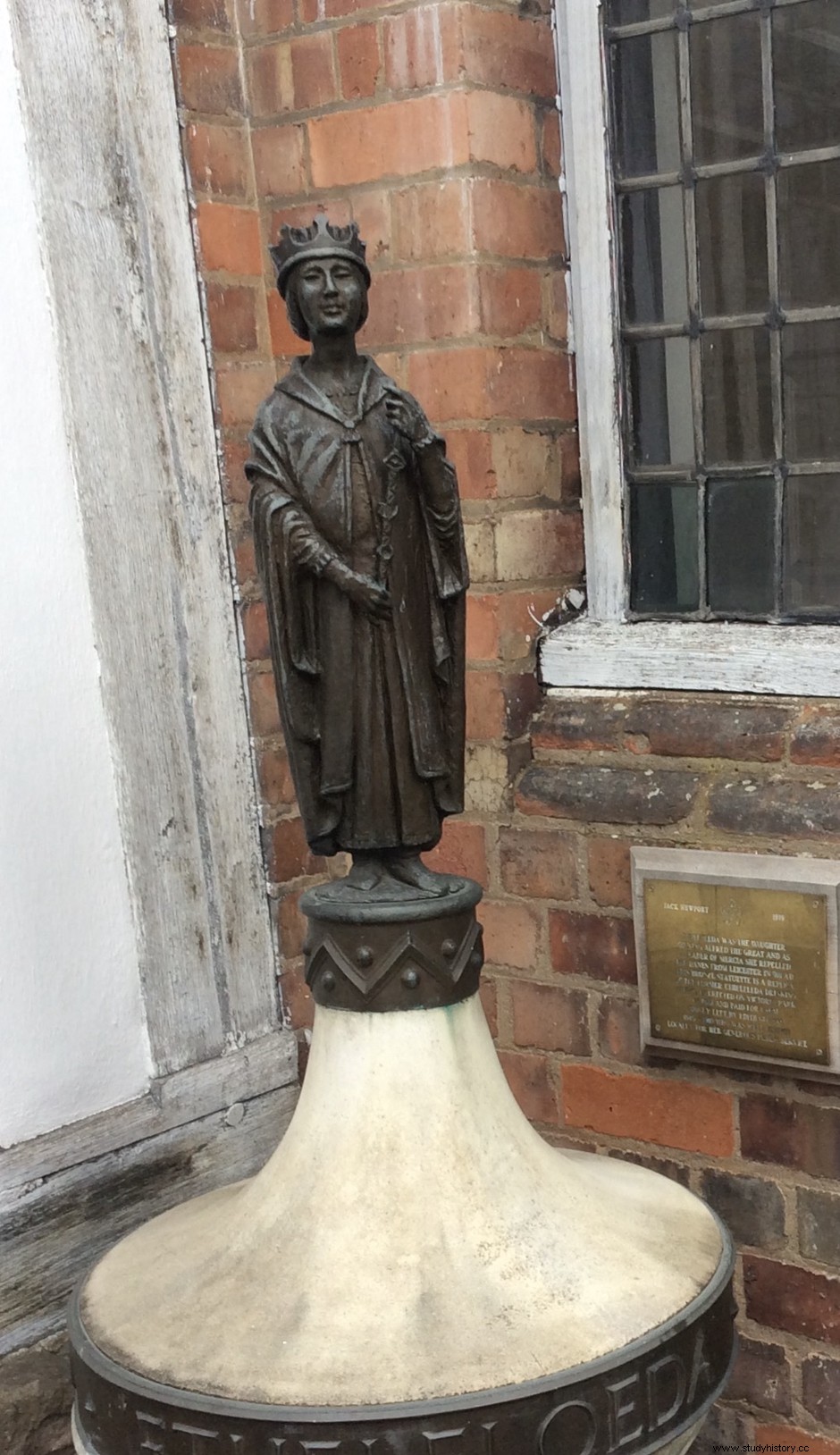The Vikings series and The Last Kingdom, the latter based on the books by Bernard Cornwell and of which the fourth season has just been released on Netflix, have made the story of the struggles between Saxons and Vikings for dominance of England very topical. There are two entries on the subject in the blog that narrate the first decades of this story and that are dedicated to the relationship between Saxons and Danes and Alfred the Great.

Today we will focus on Alfred's descendants, and especially on his daughter Aethelflaed, Lady of the Mercians. In his task of conquering the rest of England, Alfred first set his sights on the neighboring kingdom of Mercia, north of Wessex and bordering Wales. Mercia was one of the seven kingdoms that emerged after the Anglo-Saxon conquest of ancient Roman Britain. The name Mercia is a Latinization of an Old English term:Mierce or Myerce which means "border town", referring to its western boundary with the former Britons' holdings in Wales.
Mercia became a powerful kingdom under King Offa (757-796), but at the end of the 8th century it began to suffer from Viking attacks, culminating in the year 865, when the Great Heathen Army conquered the kingdoms of Northumbria, East Anglia and Mercia and threatened to do the same to Wessex. The Vikings expelled the Mercian king Burgred and divided his domain into a western part where they placed the local Ceowulf II as a puppet king, reserving the government directly for the eastern part of the kingdom.
In the year 880, and after Ceowulf's death, the eastern part of Mercia came to be ruled by one of his nobles, named Aethelred. Aware of the importance of the union between the Saxon kingdoms to defeat and expel the Vikings from England, Alfred supported Aethelred's claim to power in Mercia, in exchange for Aethelred being recognized as a vassal king of Wessex.
In the following years, Aethelred and Alfred began a series of campaigns against the Danes that led them to conquer London, whose Wessex government ceded to the Mercians. In addition, he granted her the hand of his daughter Aethelflaed, who would have been about sixteen years of age at the time. Whether as a result of her superior social status as a king's daughter or her husband's failing health, Aethelflaed became increasingly involved in the tasks of governing the kingdom. Sources from her time cite her granting land to Irish and Norwegian settlers and building forts.

Mercia maintained her alliance with Wessex both during the reign of Alfred (who died in the year 899) as with that of his son and successor, Edward the Elder. The first problem Edward had to face was the rebellion of his cousin Aethelwold, son of Alfred's older brother, King Aethelred. Let us remember that upon his death, the witan he had chosen Alfred over Aethelwold as monarch, probably because of a combination of circumstances:the youth of the late king's son and the need for a strong leader to meet the Viking threat.
Upon Alfred's death, Aethelwold took refuge with his loyalists at Wimborne, in whose abbey his father was buried, and made it known that he would live or die there. But one night he slipped away and joined the Danish army in Northumbria. The Danes swore him in as king, in an attempt to repeat what they had done elsewhere, set up a Saxon as a puppet monarch and take over the rule of his realm.
In 902, Aethelwold and his forces, together with another Danish army from East Anglia they penetrated into Mercia and from there crossed the Thames into Wessex. After several skirmishes and looting, the two armies finally met at a place called Holme. In the battle that followed the chronicles narrate that Aethelwold died and so did the father of Edward's future wife. However, in an archaeological discovery made in 2011, some coins bearing the Aldwaldus legend were found, raising the question of whether Aethelwold was able to survive the battle and reign for a few more years in Northumbria.

Edward began the task of reconquering for the Saxons the territories of the Danelaw, while trying to absorb its inhabitants as part of English society. Keep in mind that the Danes Edward now faced were no longer the fearsome Viking warriors and raiders, but settled settlers with their families; besides, what they had always known how to do was attack, and now it was their turn to defend themselves, something in which they were not so lethal.
Mercia maintained her alliance with Wessex during the reign of Edward the Elder. In 910 a Viking army from Northumbria invaded Mercia and was confronted by a contingent that included Wessex and Mercian forces. The engagement took place at Tetenhall and resulted in a Saxon victory. According to some sources, Aethelred was wounded in that battle and died as a result of his injuries, although other chronicles state that he was ill before then and did not participate in the confrontation, which could imply that the Mercian troops could lead it Aethelflaed , as he had done by directing the construction of the Bremesbyrug fortress that same year.
In this regard, it should be clarified, as Annie Whitehead points out that «we cannot be sure that Aethelflaed wielded a sword or led Mercian troops. The Mercian Register focuses on her strength-building program, although this succinct account seems to suggest that this was not unusual for women of her status."
What does seem clear is that Aethelred died in the year 911. The Mercians chose Aethelflaed as their queen, a unique case in the Anglo-Saxon kingdoms. Several circumstances must have influenced this choice:the couple's absence of an heir, her proven quality as a ruler, her good relations with her brother Edward of Wessex, and her family ties to the Mercian nobility.
His role as the sole leader of her people was strengthened when she decided not to marry again. The Anglo-Saxon Chronicle refers to her as The Lady of the Mercians. For her part, Welsh sources give her the title Queen of Mercia. There are also constant references from the chroniclers of the time that Mercia ruled by divine grace.
Aethelflaed swore an oath to his brother Edward, recognizing Wessex's suzerainty over Mercia and ceding important tracts and cities (such as London and Oxford), in return for Wessex's military aid to contain the Viking raids, which threatened the east of the kingdom and were more easily defended from Edward's reign, while she used Mercian troops to war with neighboring Welsh to the west and with the Danes from Northumbria on the northern frontier.
Aethelflaed's main military objective was to recover the former Mercian territories occupied by the Danes, the north of the so-called Danelaw, and she always did it independently but in close cooperation and coordination with her brother Eduardo de ella, who from Wessex attacked the southern part of the Danelaw .

Aethelflaed built up to ten strategically placed fortresses to to cement their campaigns and serve as a base for their armies and as a refuge for the population against Danish or Welsh invasions, as well as to guarantee control over the land and river communication lines of Mercia. The most important of these was Warwick (founded in 914). Following a series of campaigns to settle the western border with Wales, including a punitive expedition against the Welsh, in 917 Aethelflaed set out from Wales itself to conquer the Danelaw . Once again, this campaign was coordinated with the attack by her brother Eduardo de ella from Wessex. The Lady of the Mercians she managed to capture significant cities, such as Derby in 917, where she had four of the city's leading lords executed, and Leicester in 918, where the garrison surrendered without resistance.
News came that the citizens of York were willing to submit to Aethelflaed to free themselves from Danish rule, but before he could put his plans into effect, Aethelflaed passed away on 12th June 918 in Tamworth. Her remains were transferred to St. Oswald's Church in Gloucester, which she and her husband had founded twenty years earlier. 
Annie Whitehead summarizes the figure of Aethelflaed thus:
We can't know for sure, but she must have been a remarkable woman of strong character. There may be precedents for a female ruler, but not in such complex circumstances. That Edward allowed her to take over the government of Mercia, first after her husband's illness and then after her death, when he could have brought Mercia under her direct control says a lot about her and their relationship. between the two Chronology matters, and Edward's decision not to allow Aethelflaed's daughter to take over the government, which may suggest that Aelfwynn had less of a personality, may also be due to the fact that her sister Edward already had grown children when she died.
On his death, his daughter Aelfwynn took the crown of Mercia, although his government was very brief, since good relations with Edward of Wessex died at the same time as Aethelflaed did... but that's another story, told in the entry about Athelstan, the first king of England.
Image| Wikimedia Commons, author archive.
Peter Ackroyd. The History of England. Volume I. Foundations.
Annie Whitehead.Mercia. The rise and fall of a Kingdom.
J.R. Watkin. Dark Age Warwick &The Warrior Queen. Aethelflaed, Lady of the Mercians, &The origins of Waeringwicum
